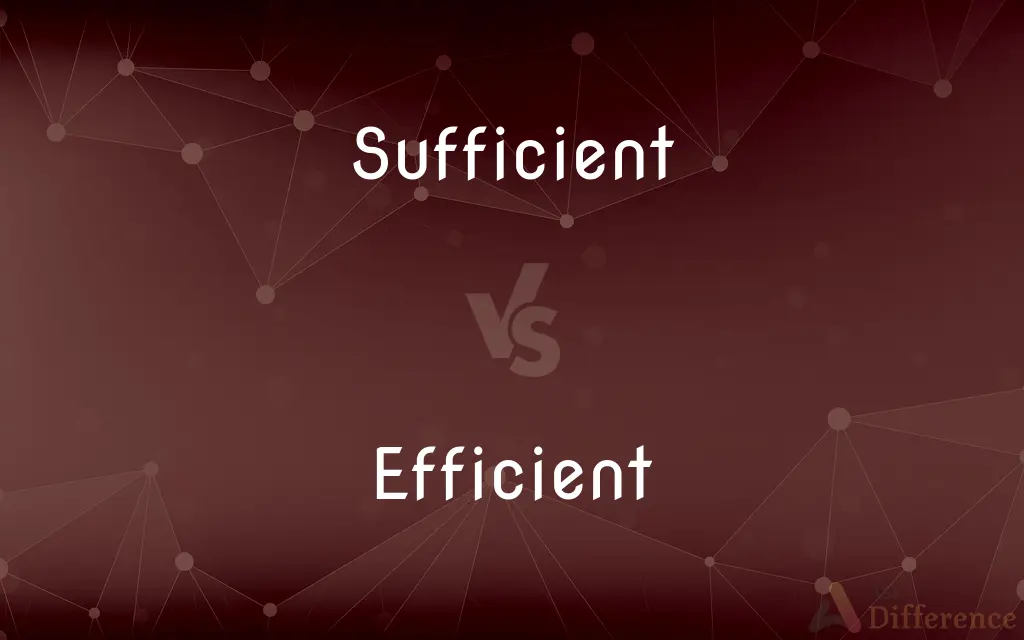Sufficient vs. Efficient — What's the Difference?
By Maham Liaqat & Fiza Rafique — Updated on March 7, 2024
Sufficient means adequate to meet a need or requirement without excess; efficient denotes achieving maximum productivity with minimum wasted effort or expense.

Difference Between Sufficient and Efficient
Table of Contents
ADVERTISEMENT
Key Differences
Sufficient refers to the adequacy of something in quantity or quality to meet a specific need or requirement. It implies that something meets the minimum criteria necessary for a particular purpose, without indicating how well it performs beyond that threshold. In contrast, efficient emphasizes performance, specifically the ability to achieve a goal or function with the least amount of waste, time, or effort. Efficiency is often related to the process or method of achieving an outcome, rather than the adequacy of the outcome itself.
While sufficiency focuses on the end result being enough to satisfy a need, efficiency is concerned with the method of reaching that result. For example, having a sufficient amount of food means having enough to feed everyone, whereas having efficient food production processes means achieving that goal with minimal waste or resources. Efficiency can lead to sufficiency, but the two concepts operate on different aspects of achieving goals.
A sufficient solution to a problem meets the necessary requirements, but it might not do so in the most resourceful way. An efficient solution, however, not only meets these requirements but also optimizes the use of resources. This distinction is crucial in fields like economics, environmental science, and engineering, where both the outcome and the process are important.
Efficiency is often quantifiable and can be measured in terms of ratios or percentages, indicating how much of the input is effectively converted into output. Sufficiency, on the other hand, is more subjective and situational, depending on the specific needs or standards that define what is considered "enough."
While both sufficiency and efficiency relate to the concept of adequacy, sufficiency is about meeting a defined level of need, and efficiency is about the optimal use of resources to achieve a goal. The relationship between them is nuanced, as efficiency can contribute to sufficiency, but sufficiency does not inherently imply efficiency.
ADVERTISEMENT
Comparison Chart
Definition
Adequate for a purpose, meeting basic requirements.
Maximum productivity with minimal waste or effort.
Focus
Outcome or end result.
Process or method of achieving the outcome.
Measurement
Subjective, based on whether needs are met.
Quantifiable, based on ratios or efficiency percentages.
Context
Often used in discussions of resources, needs, or capacity.
Used in contexts emphasizing performance and resource optimization.
Relation to Goals
Ensures that goals are met at a basic level.
Ensures goals are met optimally, with consideration for resource use.
Compare with Definitions
Sufficient
Enough to meet the needs or requirements.
The team had sufficient resources to complete the project on time.
Efficient
Achieving maximum productivity with minimal wasted effort or expense.
The new software enabled efficient data processing.
Sufficient
Adequate in amount, quality, or degree.
There was sufficient evidence to support the theory.
Efficient
Characterized by a high output-to-input ratio.
The factory's efficient use of materials reduced costs.
Sufficient
Meeting the minimum criteria.
His grades were sufficient to secure admission to the university.
Efficient
Resulting in the desired outcome with little waste.
Efficient planning led to the project's success.
Sufficient
Capable of satisfying the specified need.
The information provided was sufficient for making an informed decision.
Efficient
Operating in a way that saves time, effort, or cost.
He devised an efficient method for completing the task.
Sufficient
Just enough to achieve a purpose.
A single lamp was sufficient to light the small room.
Efficient
Resourceful and effective in performance.
The team's efficient work habits increased productivity.
Sufficient
Being as much as is needed; adequate; enough.
Efficient
(of a person) working in a well-organized and competent way
An efficient administrator
Sufficient
(Archaic) Competent; qualified.
Efficient
(of a system or machine) achieving maximum productivity with minimum wasted effort or expense
More efficient processing of information
Sufficient
An adequate quantity of; enough.
We have sufficient supplies to last the winter.
There is not sufficient access to the Internet in many small rural villages.
Efficient
Acting or producing effectively with a minimum of waste, expense, or unnecessary effort
An efficient builder.
An efficient factory.
Sufficient
(as pronoun) A quantity (of something) that is as large as is needed.
We don't need any more; we already have sufficient.
Sufficient of us are against this idea that we should stop now.
Efficient
Acting directly to produce an effect
The efficient cause of the revolution.
Sufficient
Of a type or kind that suffices, that satisfies requirements or needs.
This is a necessary condition but not a sufficient one.
Efficient
Causing less waste or requiring less effort than comparable devices or methods. Used in combination
Energy-efficient wind turbines.
Cost-efficient health care.
Sufficient
Possessing adequate talents or accomplishments; of competent power or ability; qualified; fit.
Efficient
Making good, thorough, or careful use of resources; not consuming extra. Especially, making good use of time or energy
An efficient process would automate all the routine work.
Our cleaners are almost too efficient: they throw away anything left out on a desk.
Sufficient
(archaic) Capable of meeting obligations; responsible.
Efficient
Expressing the proportion of consumed energy that was successfully used in a process; the ratio of useful output to total input
The motor is only 20% efficient at that temperature.
Sufficient
(obsolete) Having enough money to meet obligations and live comfortably.
Efficient
Causing effects, producing results; bringing into being; initiating change (rare except in philosophical and legal expression efficient cause = causative factor or agent)
Ownership, maintenance, or use of the automobile need not be the direct and efficient cause of the injury sustained
Sufficient
Equal to the end proposed; adequate to wants; enough; ample; competent; as, provision sufficient for the family; an army sufficient to defend the country.
My grace is sufficient for thee.
Efficient
Effective, efficacious
Sufficient
Possessing adequate talents or accomplishments; of competent power or ability; qualified; fit.
Who is sufficient for these things?
Efficient
(obsolete) a cause; something that causes an effect
Sufficient
Capable of meeting obligations; responsible.
The man is, notwithstanding, sufficient . . . I think I may take his bond.
Efficient
Causing effects; producing results; that makes the effect to be what it is; actively operative; not inactive, slack, or incapable; characterized by energetic and useful activity; as, an efficient officer, power.
The efficient cause is the working cause.
Sufficient
Self-sufficient; self-satisfied; content.
Thou art the most sufficient (I'll say for thee),Not to believe a thing.
Efficient
An efficient cause; a prime mover.
God . . . moveth mere natural agents as an efficient only.
Sufficient
Of a quantity that can fulfill a need or requirement but without being abundant;
Sufficient food
Efficient
Being effective without wasting time or effort or expense;
An efficient production manager
Efficient engines save gas
Efficient
Able to accomplish a purpose; functioning effectively;
People who will do nothing unless they get something out of it for themselves are often highly effective persons...
Effective personnel
An efficient secretary
The efficient cause of the revolution
Common Curiosities
Is it possible to be sufficient without being efficient?
Yes, it's possible to meet a need (sufficient) without utilizing resources in the most productive way (inefficient).
Why is efficiency important in business?
Efficiency is crucial in business because it reduces costs, increases productivity, and can lead to better profitability.
What is the key difference between sufficient and efficient?
Sufficient means having enough to meet a need, while efficient refers to achieving goals with minimal waste or effort.
Does efficiency always lead to cost savings?
Generally, yes, as efficiency involves reducing waste and optimizing resource use, which can lead to cost savings.
Can a process be efficient but not sufficient?
Yes, a process can be efficient in using resources but still not provide enough output to meet a need, making it not sufficient.
How does sufficiency relate to sustainability?
Sufficiency in sustainability means using resources to meet current needs without compromising future generations' ability to meet theirs.
How do you measure efficiency compared to sufficiency?
Efficiency is measured by the ratio of useful output to input, whereas sufficiency is assessed based on whether needs or requirements are met.
Can a product be designed to be both sufficient and efficient?
Yes, products can be designed to meet needs adequately (sufficient) while also using resources optimally (efficient).
Can efficiency affect quality?
Yes, increased efficiency can improve quality by streamlining processes and eliminating unnecessary steps, but if not managed well, it could also compromise quality by cutting corners.
Is efficiency more relevant than sufficiency in environmental conservation?
Both are important: efficiency in using resources wisely and sufficiency in ensuring that resource use does not exceed what the planet can sustainably provide.
Share Your Discovery

Previous Comparison
Neuron vs. Axon
Next Comparison
Scull vs. SkullAuthor Spotlight
Written by
Maham LiaqatCo-written by
Fiza RafiqueFiza Rafique is a skilled content writer at AskDifference.com, where she meticulously refines and enhances written pieces. Drawing from her vast editorial expertise, Fiza ensures clarity, accuracy, and precision in every article. Passionate about language, she continually seeks to elevate the quality of content for readers worldwide.














































